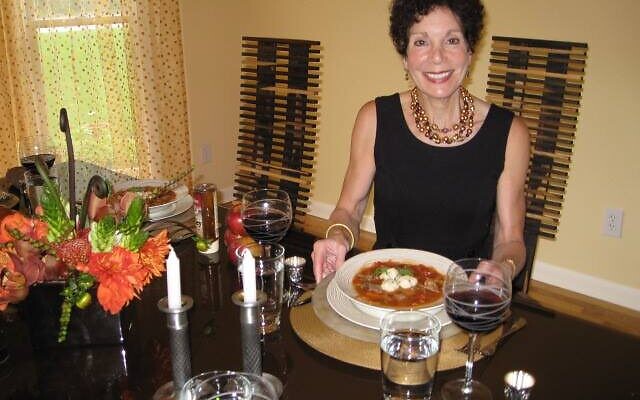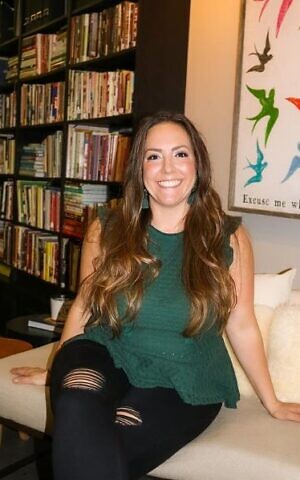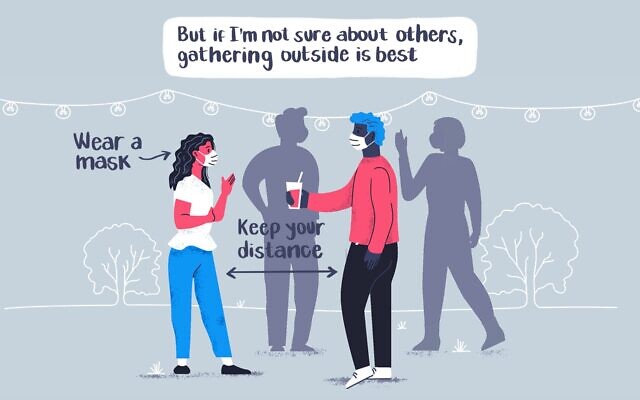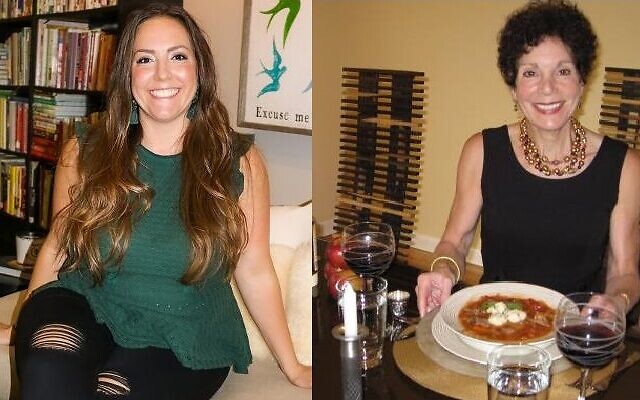Caterers Stay Flexible for Simcha Events
Two caterers reflect on how the pandemic has thrown a wrench into the business of celebrations.
By necessity, in these days of COVID-19, flexibility is Annette Marcus’s middle name. The head of Annette Marcus Catering, who accommodates simcha events in synagogues and homes for Shabbat kiddushes, b’nai mitzvot, baby namings, birthdays and weddings, said her business changes “week to week.” People make plans and then cancel. Or instead of nice buffets, she boxes up lunches.
“I did a bar mitzvah in August,” Marcus recalled. “It had been canceled from March 2020, then August 2020 and finally had it a year later. People just need to be creative. They have to be flexible. I try to steer clients for the most vulnerable people. I want them to be aware.” She compares it to a gathering that might include one person who requires kosher food, so all the food is kosher.

Erin P. Lis, vice president of sales and marketing for Added Touch Catering, told the AJT, “The name of the game is plans keep changing as COVID keeps changing. The Delta variant has really thrown the vaccination thing.”
Indeed, in late spring and early summer, after people started getting vaccinations, many relaxed, thinking that the country was going to beat the pandemic that launched waves of viral infections, hospitalizations and death across the U.S., starting in late February 2020. Then the more contagious Delta variant snuck its way into people’s lives, unleashing more infections, hospitalizations and deaths.

In Georgia, as of Sept. 10, more than 20,000 people have died of COVID-19 and there have been 1.51 million total cases confirmed, according to the Georgia Department of Public Health. And while three states in the Northeast have reported vaccination rates of around 70 percent, in Georgia, only 45 percent are fully vaccinated. Hospital intensive care units are filling up.
U.S. President Joe Biden echoed many Americans’ frustration that more people haven’t been vaccinated, thus requiring those who have rolled up their sleeves to remain vigilant against spreading the latest variants of the virus.
Caterers report that most members of the Atlanta Jewish community just want to return to some sense of normalcy. “People are tired of waiting on life. Weddings that were postponed from last year might have been safer last year,” said Lis. “People put on seatbelts but don’t stop driving.”
The COVID equivalent to wearing seatbelts might be wearing masks and getting vaccinated. Certainly, catering servers are wearing masks, but hosts of simchas are experimenting with many tools to safeguard guests. “We are doing a big bar mitzvah in a backyard,” reports Lis. Rather than requiring rapid COVID tests for arriving guests, there will be COVID-sniffing dogs and a “holding area, so if someone is sniffed positive, they can do a rapid test or go home. It’s a safe zone for the party.” Others are inviting only vaccinated people. “Once people are drinking, the masks come off,” Lis said. “Once people are drinking, they forget about masks.”

Both Lis and Marcus recommend that parties be held outside. With cooling temperatures, food can be set up outdoors as well. “I tell clients not to have their bars in their kitchens” where people would congregate, Marcus said. “But some people act like nothing is happening. They are ‘old school,’” she noted, referring to one older couple who were celebrating the husband’s birthday. “Not everyone is concerned.”
Lis agreed: “Many are just living their lives. The issue for bar and bat mitzvah-aged kids is that there are younger siblings who can’t get vaccinated.”
Flexibility is required, Marcus underlines, because “every little event has some little twist or nuance to address.” Both caterers, however, say business is brisk. “We are definitely ten times busier than the same time last year,” said Lis. “The quantity of events is as big, but events are smaller. An event that would have been 300 is now 150, or one that would have been 150 is now about 75.”
Larger community events continue to be held virtually, caterers report, although Lis said there’s one on the community calendar for November. “It might be the first large community gathering,” with “might” being the operative word.
Marcus believes that, for the most part, the community needs “to stay where we are for the rest of the year.” That means more creativity, more flexibility and more uncertainty. In other words, the new normal.
- Jan Jaben-Eilon
- STYLE Magazine
- Simchas
- COVID-19
- Annette Marcus
- Annette Marcus Catering
- simcha events
- Synagogues
- Shabbat kiddushes
- b’nai mitzvot
- baby namings
- Birthdays
- Weddings
- Bar Mitzvah
- Bat Mitzvah
- Delta variant
- Erin P. Lis
- Added Touch Catering
- Georgia Department of Public Health
- Vaccinated
- President Joe Biden
- Masks
- rapid COVID tests
- safe zone
- Outside parties
- Flexibility
- community events
- virtually




comments